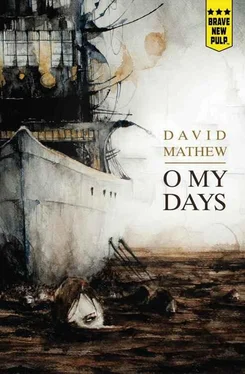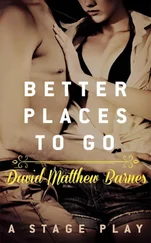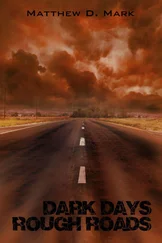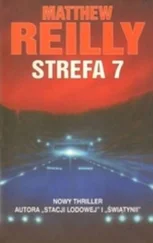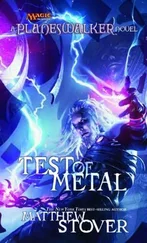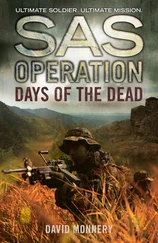I can’t get used to living my life, living my life, living my life without you, by my side.
It’s two sheets of A4 lined paper, both sides covered, the script miniscule; in some places Dott has even written two lines of print between a set of lines, the words on top of one another like motoring wrecks.
I start to read again.
Entr’acte:
The Prison Ship and the Oasis
Oil trapped on water is what I remember most clearly. The slicked rainbows and the water-bound constellations. The dreams that the smears seemed to incorporate. I was there—and I recall it all vividly.
In the distance we could sometimes hear bombs detonate. We didn’t care. The oil and the water—they were what we lived for.
Something pretty. Something pretty in the relentless gloom.
I was thirsty. We all were. All two hundred of us.
You think you know about cramped, Billy Boy?
Fuck double bang-up. Fuck bunks and shared privileges.
You don’t know how lucky you’ve been, son.
We were there on that ship, all two hundred of us, fighting for a place to sleep, and dreaming of the water in the oasis. Imagine that: every day. A fight—a physical fist-fight—for somewhere to lay your head when you got weary.
Some tried to vault the barriers. Granted access to the upper deck—the equivalent of an Enhanced—some abandoned their mops, climbed the rails, and belly-flopped into the stagnant tide. To escape.
They died.
The oil was a treat and a curse.
It was smeared across the water like marmalade. It stank of offal and aftershave. But it was my guiding inspiration.
They drowned. Or they took a bullet in the shoulderblades. Either way.
The Prison Ship was called The Oasis . And we were moored in the Oasis. Rumour ran that the rowboats surrounding our ship were manned by robots and electronic personnel. I have nothing to prove it either way. There was a rumour that when one of our jailers spontaneously exploded in his rowboat it was because of water in his circuitry. But I can’t prove that.
The Oasis is two miles wide. Skinny ghost that it is, it’s about a half of that long. And no one has ever asked me where I came from.
I made certain of that. I chose my crimes carefully.
What is more likely to eclipse an interest in a past than a present that is so repulsive and abhorrent? I chose rape and mutilation.
You’ll ask me why. You’ll ask me many things, Billy.
And I will try to explain.
Just like I did, you came to Dellacotte in the back of a padded van. In the desert there are no padded vans. My crime was theft. Prometheus stole fire and was punished for eternity. But me, I stole water—and was sentenced to a lifetime on top of it, in the hold of a ship. My equivalent of a padded van was a pre-programmed boat. To cheers and boos I was manhandled into my rowboat but I had no need of oars. The boat knew which way to go: towards the hulk in the distance, looking liquid under the noonday sun.
I climbed a wriggling rope ladder and was hauled aboard.
Among the first things that I was told was not to take personally the savage kicking I received when I landed on the deck like an asphyxiated trout. All new arrivals got their guts and livers kicked blue. It was a way of establishing routine, normality—and hierarchy.
Above everything else, violence establishes a hierarchy—a chain of command, if you will. But you know that already, don’t you, Billy?
Why else are you here? Because you lost the race.
And I will always have more answers than you have questions.
Raging is too grand a term, but a war was certainly ongoing. You could hear the pilots overhead; you could hear the pock-marking detonations.
A war was ongoing and I didn’t wish to be a part of it.
My crime was theft. Bombs meant nothing to me, blood. And to tell you the truth, blood meant nothing much to me either.
I stole water. I stole water more than once, but I was thirsty. Dying of thirst. I didn’t know what else I could do to maintain my equilibrium. I needed water.
Is that clear enough?
I needed water as much as I needed air. It wasn’t free and I couldn’t afford to buy it. So I did what others did: I stole it.
The oasis was feared and revered. To the inhabitants of the shanties and the slums it was where a stereotypical Heaven and a stereotypical Hell met comfortably. It was home. It was life. The oasis meant a break from the heat.
There were makeshift establishments, scattered here and there. Little pockets of civilisation. Freckles on the arm of a country.
But which country?
I’m astonished, Billy-Boy, that you’ve been so slow in the asking. You disappoint me, cuz.
You’ll ask me where. You’re not a moron: you’ll ask me where.
And I’ll say: desert.
…Barry Manilow wrote the songs the whole world sang.
I commited the crimes the whole world watched. And subsequently, I was able to brilliance a total re-focusing away from my past, from my history.
Given what I’d done, who cared where I’d lived.
Dott? What sort of fucking name is Dott?
I stole it from a Neasden Town snooker player.
My name—my real name—you will never know. You don’t need to.
Not twice in your life would you be able to spell it, and not once would you be able to say it aloud. Imagine the car- crash of letters.
The only important thing is where I lived.
Places shape us; places build us.
I was a desert child and no one has ever thought to check me out. To dry me out to bare the desert: the desert. The Sahara.
Made from sand and dust, I was a man before I was a boy. I have never been a boy. I don’t remember anything but the sand, the dust…
Wearing a scarf and a pair of goggles was the norm. It was a necessity, to protect your eyes against the white light and the smotes. You started your day fully clothed—stepping out into the raging heat—and you finished it by stripping to the knackers. In other countries you dress for the chill of the night- time hours, but we—we couldn’t wait for it.
Night-time was like having the cuffs unshackled.
I remember the time when Morjardahid discovered grass.
It can’t be explained. But Morjardahid found grass in the sand—and grass doesn’t grow in the sand—and he brought it back to The Wethouse for inspection and praise. His lips were baboon-bum red with excitement.
The Wethouse. The Wethouse was what we called the hospital. The sick went in and did not return. The negatives—the not-yet-borns—went in and stayed a long time. The wetnurse’s name was Saira el Door.
That name, and the taste of her left nipple, I remember fondly.
Me? I had the ageing disease.
Generating electricity was part of the punishment, for some lags.
You’ve seen the films, Billy.
Row! Row! Row your boat! Gently down the stream! But there was no boat. And there was no stream.
There was a ship and there was an oasis.
Why a ship? No rain, and yet the oasis thrived. Allow it.
But why a ship? Why not drown us and burn the bones? We meant next to nothing. So why the consideration?
Why a ship?
The Leper Island is the answer.
We were held in the grip of fear by the Leper Island. It might have been no more than the size of five prisons, but it didn’t matter.
We felt the breath. That was the real punishment.
Blackened breath on a stale, hot breeze.
…I’ve changed my mind: my name is Noor Aljarhalifaro. (I’ve changed my name too - but you already knew that.) You can call me Dott. That’s a joke.
If it had one—or one that was widely accredited—the township was called, variably, Umma —meaning ‘community of believers’—or Mostashifa —meaning ‘hospital’. A town called Hospital.
Читать дальше
